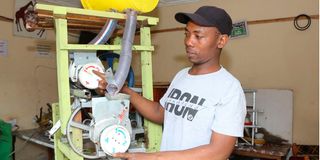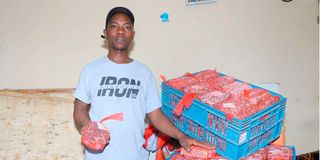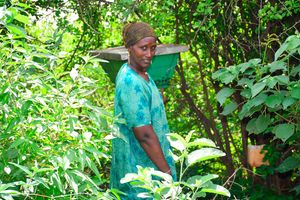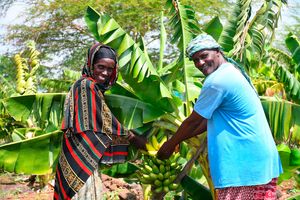
Steve Mburu, a resident of Induatrial Area in Njoro with the machine he uses to add value to his groundnuts.
The groundnut value chain plays a big role in improving family livelihoods. However, processors face numerous challenges, including having reliable sources of raw materials. It forces them to import nuts from Malawi, Tanzania, Argentina, India and other countries.
Steve Mburu, a resident of Industrial Area in Njoro, is not new in the groundnut business. He has experienced shortages of nuts, exploitation by middlemen and inadequate resources for marketing.
Mburu has come up with homemade technology to upscale supply and improve the quality of his groundnuts.
“Value-added nuts fetch a better price than raw, boiled or roasted produce,” he says.
Mburu adopted advanced machinery and digital tools on realising that adding value to nuts manually was tedious and expensive.
The modern roasting kit, for instance, is eco-friendly, sustainable and energy efficient. With it, Mburu has increased productivity with improved precision.
Mburu now has weighing, roasting, packaging, cleaning, shelling, grading, sorting, conveyor and packaging machines. He says the nut shells and other by-products do not go to waste as they are converted to feed for poultry and other domestic animals.
The business began with a capital of just Sh250 in 2014, Mburu says.
“Growing up in a family of groundnut sellers, I learnt business lessons from my parents,” he says.
From the Sh250, Mburu bought Sh200 groundnuts, with the remaining amount going to packaging materials.
Two years down the line, he had made profit and many clients. He then incorporated mechanisation into his business in 2020 in order to improve efficiency, cut costs and sustain the rapidly growing market.
Initially, Mburu could refill his gas cylinder to roast the groundnuts, a process that was cumbersome and time-consuming. It would take at least half an hour for the nuts to be ready.

Steve Mburu displays his packaged groundnuts in this picture taken on January 3, 2025.
The advanced machine he bought and assembled now takes just 10 minutes to do the job.
Mburu sources most of his groundnuts from National Cereals and Produce Board (NCPB) stores in Nakuru. These are mainly imported from Malawi. A kilo goes for Sh248 to Sh250.
Once the nuts arrive, they are sorted, washed, sorted again, weighed and salted. They are then placed in the roasting machine, which is fitted with accessories to reduce moisture and dry the nuts.
Mburu adds value to 100 to 150 kilogrammes of nuts every week, depending on orders placed by customers.
To ensure high hygiene standards, Mburu’s employees must have dust coats and gloves. Visitors are only restricted to the processing area. He uses packaging machines that ensure minimal contact with the nuts.
Mburu also has plans for the future. He aspires to start making cooking oil, flour, peanut butter and converting the hulls into an important component of organic fertiliser.
His business has employed four young people directly, with the duties being split into processing, packaging, marketing and transport. The processor employs tens of locals indirectly.
Most of his customers are from the neighbourhood, with others coming from as far as Narok and Baringo counties.
Mburu uses X (formerly Twitter), Facebook, WhatsApp and other social media platforms to market his products.
The groundnuts are packaged in quantities that sell for as low as Sh10.
Mburu’s major challenge is acquiring the many permits and certification by devolved and national government agencies. Getting one permit can take many days or weeks.
Mburu he sees himself working with automated more complex machines for better product quality and improved safety two years from now.









